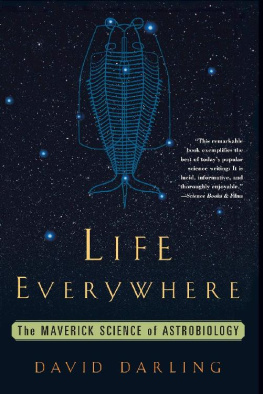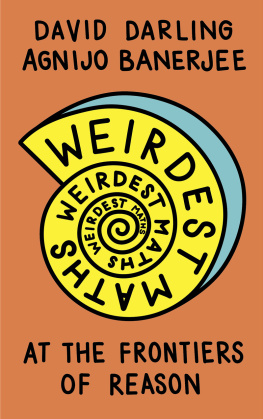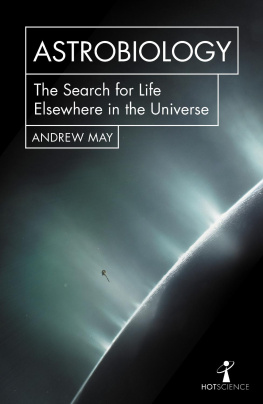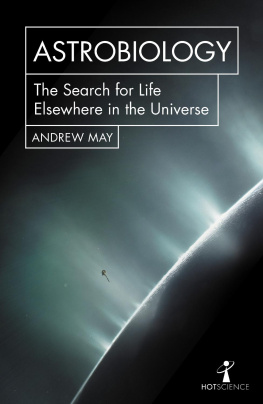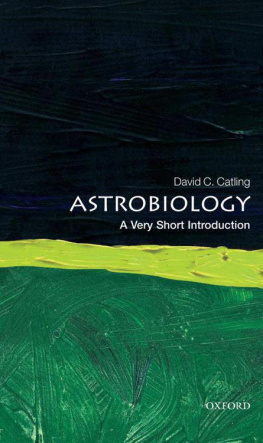Table of Contents
With Love,
to my wife, Jill
my children, Lori-An and Jeff
and my parents, Eric and Marjorie Darling
ACKNOWLEDGMENTS
First, Id like to thank Bill Frucht, senior editor at Basic Books, who played an essential role in the genesis and development of this book. To him goes credit for the original concept, much of the organization, and numerous intelligent and insightful suggestions.
For providing me with information, opinions and advice, Im grateful in particular to: Gustaf Arrhenius, Scripps Institution of Oceanography; Mark Bedau, Reed College, Portland, Oregon; Max Bernstein, NASA Ames Research Center; Jay Brandes, University of Texas at Austin; Simon Conway Morris, University of Cambridge; Alex Ellery, Queen Mary and West-field College, London; Clark Friend, Oxford Brookes University; Guillermo Gonzalez, University of Washington; Joseph Kirschvinck, California Institute of Technology; Geoffrey Marcy, University of California, Berkeley; Stephen Mojzsis, University of California, Los Angeles; Thomas Ray, University of Oklahoma; Gregory Schmidt, NASA Ames Research Center; Victor Tejfel, Fesenkov Astrophysical Institute; HojatollahVali, McGill University; and Peter Ward, University of Washington, Seattle. Any mistakes or misinterpretations that may have crept into the text are, of course, my responsibility alone.
As always, my agent Patricia van der Leun worked tirelessly behind the scenes and provided support above and beyond the call of duty. Thank you again, Patricia.
Last, and most of all, I thank my family. Only through their support and encouragement, over many years, have I been lucky enough to pursue a fantasy career instead of a real job.
PREFACE
Something extraordinary has happened over the past decade. Without any fanfare, scientists the world over have reached a consensus on one of the most profound questions ever to challenge the human mind: Are we alone? In all of this vast and ancient cosmos, is life confined to Earth?
No. Almost beyond doubt, life exists elsewhere. Probably, in microbial form at least, it is widespread. And more likely than not, we will find incontestable evidence of it quite soonperhaps within the next ten to twenty years. These are the core elements of the remarkable new accord that is now routinely accepted by researchers across a spectrum of disciplines.
Behind this surge in scientific optimism about the prospects for alien life lies a rush of remarkable discoveries. A bewildering assortment of (mostly microscopic) life-forms has been found thriving in what were once thought to be uninhabitable regions of our planet. These hardy creatures have turned up in deep, hot underground rocks, around scalding volcanic vents at the bottom of the ocean, in the desiccated, super-cold Dry Valleys of Antarctica, in places of high acid, alkaline, and salt content, and below many meters of polar ice. The range of locales where organisms could be expected to survive in the universe is thus vastly expanded. Some deep-dwelling, heat-loving microbes, genetic studies suggest, are among the oldest species known, hinting that not only can life thrive indefinitely in what appear to us totally alien environments, it may actually originate in such places. If soif the cradles of biogenesis tend to be hot, dark, subsurface hells rather than our familiar sun-drenched surface edensthen the widespread appearance of life throughout the cosmos is made much more likely.
Scientific opinion has also shifted dramatically toward the view that life may be easyable to assemble itself from simpler components at the slightest opportunity. How else to account for the signs in ancient rocks that bacteria proliferated on Earth as long ago as 3.8 billion years, during the intense bombardment phase following the birth of our solar system? Terrestrial life appeared almost before it had a reasonable chance of long-term survival, then somehow managed to weather the ferocious early storm of asteroid and comet impacts. An increasingly common claim among researchers is that life may arise inevitably whenever a suitable energy source, a concentrated supply of organic (carbon-based) material, and water occur together.
These ingredients are starting to look ubiquitous in space. Comets, in particular, are increasingly seen as significant vehicles for delivering water and organic cocktails to infant worlds. And with the discovery on Earth of meteorites from Mars, the interplanetary transfer of biochemicals or even life itself has become a respectable topic of debate.
Both within and beyond the solar system, the list of potential places where life may have become established is growing fast. Close to home, Jupiters moons Europa and Ganymede have taken on biological interest with the realization that they may harbor chemical-rich oceans of water beneath their icy surfaces. Farther afield, the finding of dozens of extrasolar planetsalmost as soon as we knew how to look for themencourages scientists to think that planetary systems around stars are the rule rather than the exception. From origin of life studies to complexity theory, from extrasolar planet detection to work on extremophiles, from pre-Cambrian paleontology to interstellar chemistry, the emerging message is clear and virtually unanimous: extraterrestrial life is there for the finding.
Having generally agreed that its only a matter of time before the first alien organisms come to light, scientists are now busily laying the foundations of the new field of astrobiology. They are asking: What are the general conditions needed for life to appear? How common will it prove to be? Where will it be found? What will it be like? These are now respectable and intensely debated mainstream issuesthe subject of major conferences and numerous scientific papers every month, a focal point of interdepartmental projects at a growing number of universities and other research organizations, and a key motivating influence behind international space programs. They are the raison dtre of NASAs Astrobiology Institute, which began operations in 1998 and saw the Nobel Prize winner Baruch Blumberg (renowned for his work on hepatitis B) appointed as its head in 1999. They motivate the University of Washingtons astrobiology program in Seattle, which welcomed its first intake of graduate students in 1999. They formed the topic of the first annual conference devoted to the science of astrobiology, held at NASA Ames in April 2000. We are witnessing not just a shift in scientific paradigm but, more important, a shift in cultural acceptability among scientists, said extrasolar planet hunter Geoff Marcy. Poised on the brink of a momentous breakthrough that will change forever how humankind thinks about itself and the universe around it, astrobiology is quickly coming of age.
Like all branches of science reaching toward maturity, astrobiology is alive with diverse theories, experimental data, rumors and conjecture. These are extraordinarily frenetic times, an immensely fertile period for thought. The corridors outside conference halls are crowded with researchers in animated conversation, vying to get across their points of view, forming camps of opinion, pushing back the frontiers of knowledge and surmising what lies out there.
At first glance, it may seem that apart from their broad agreement that terrestrial life is not unique, those engaged in this new endeavor are more in discord than harmony. Certainly there are many differences of opinion about specific issues, from claims about Martian fossils to the steps involved in lifes genesis. Thats to be expected. But it isnt too early to make out, amid the tumult of claims and counterclaims, the beginnings of a


